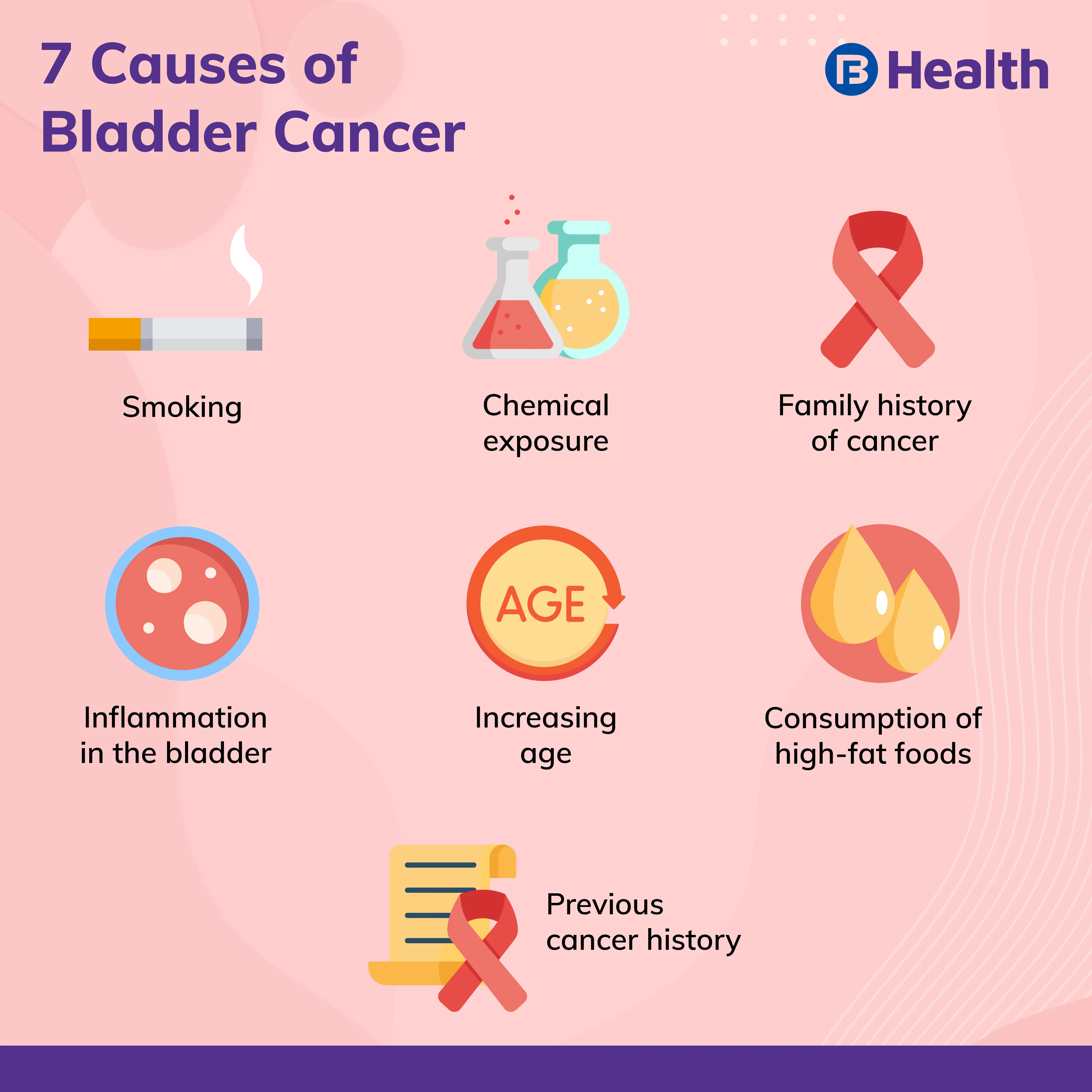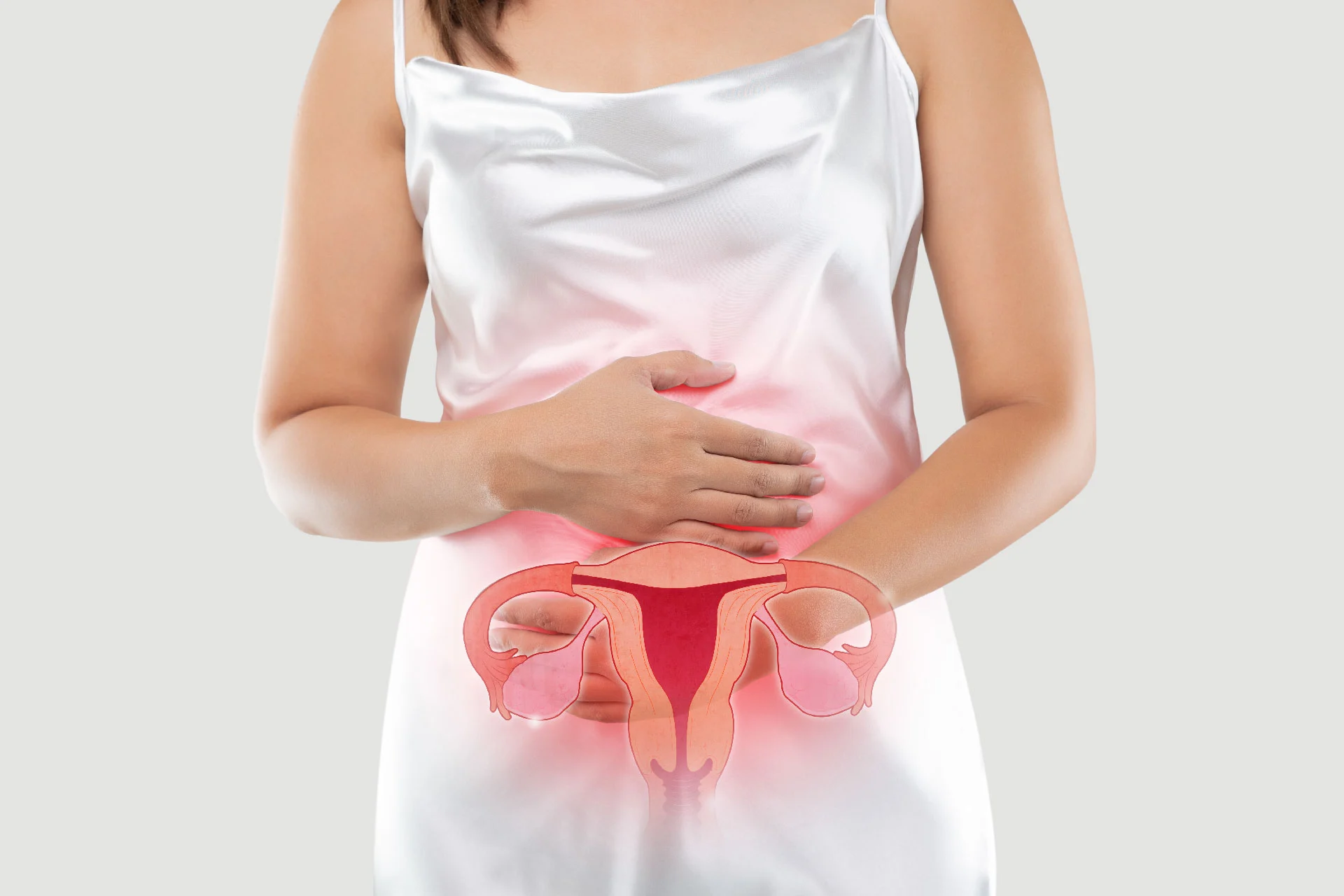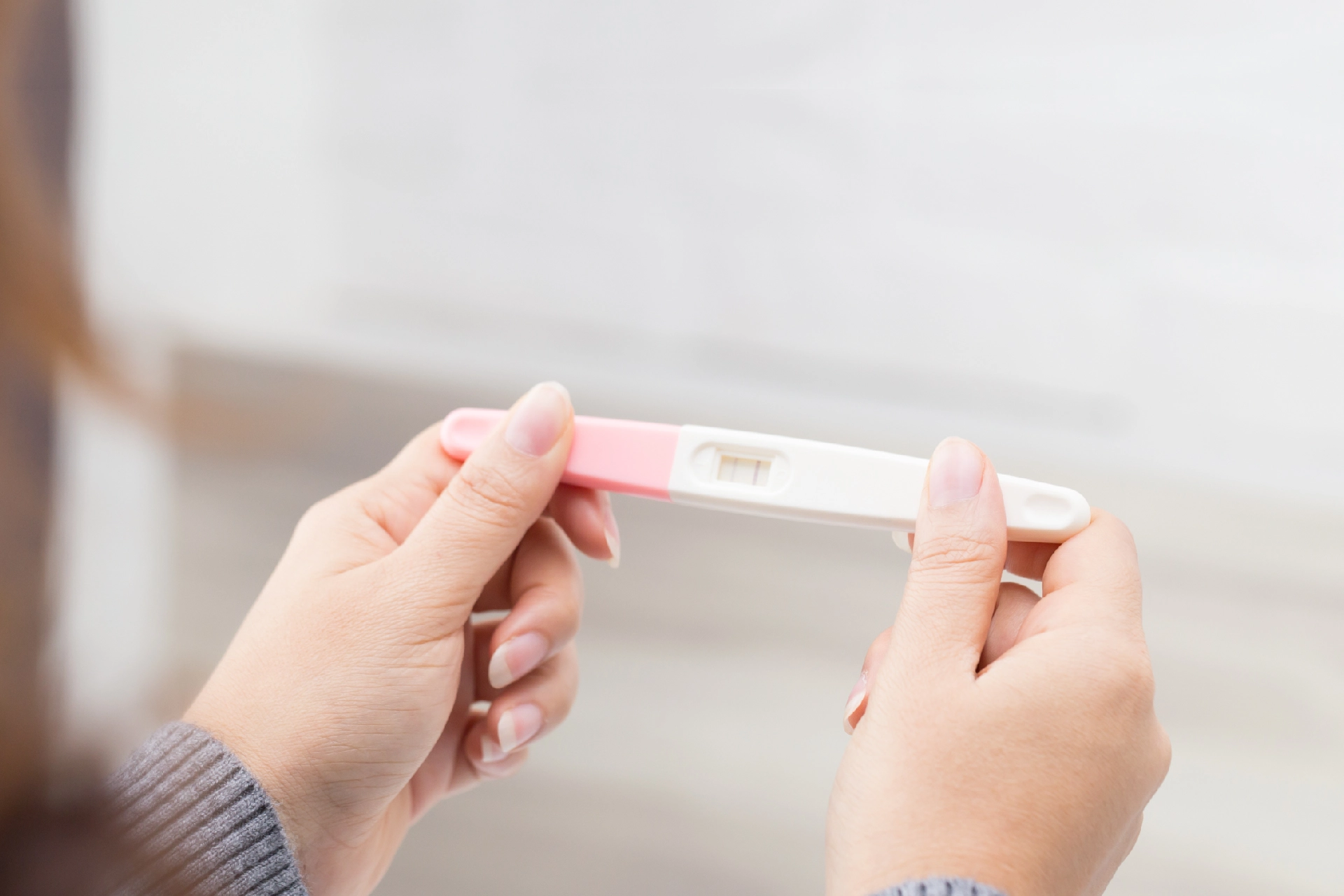Gynaecologist and Obstetrician | 8 min read
Bladder Cancer: Causes, Symptoms, Prevention and Diagnosis
Medically reviewed by
Table of Content
Key Takeaways
- Urothelial carcinoma is one of the three types of bladder cancer
- Bladder cancer can be diagnosed with urinalysis and CT scan
- Early detection helps in more effective bladder cancer treatment
Cancer refers to the uncontrollable growth of cells in your body. When it affects your urinary bladder, it is called bladder cancer. The urinary bladder has a balloon shape and is situated in the lower abdomen close to the pelvis. Its main function is to store urine until it is expelled from your body. Bladder cancer affects the urothelial cells that line the interior of your bladder.
Types of Bladder Cancer
There are three different types of bladder cancer such as[1]:
- Urothelial carcinoma
- Squamous cell carcinoma
- Adenocarcinoma
Transitional Cell Carcinoma
- Transitional cell carcinoma is a type of cancer that starts in the cells that line the urinary tract (kidneys, ureters, and bladder). It is the most common type of urothelial cancer and can be aggressive.
- There are several risk factors for transitional cell carcinoma, including smoking, exposure to certain chemicals, and having a history of bladder infections. Treatment options include surgery, radiation therapy, and chemotherapy.
- You must see a doctor immediately if you have any transitional cell carcinoma symptoms. Early diagnosis and treatment can improve the chances of a successful outcome.
Squamous Cell Carcinoma
- Squamous cell carcinoma is a type of cancer that develops in the skin's squamous cells. Squamous cells are the thin, flat cells that make up the outer layer of the skin.
- This type of cancer is most commonly found in the head and neck region but can also occur in other parts of the body, such as the arms, legs, and trunk.
- Squamous cell carcinoma is usually slow-growing but can sometimes spread to other body parts, such as the lymph nodes.
Adenocarcinoma
- Adenocarcinoma is a type of cancer that develops in the epithelial cells lining the glandular tissues of the body.
- This type of cancer is the most common type diagnosed in men and women. Adenocarcinoma can develop in any glandular tissue in the body but is most commonly found in the lungs, breast, colon, and prostate.
- Symptoms of adenocarcinoma can vary depending on the tumour's location but may include coughing, chest pain, difficulty swallowing, abdominal pain, and weight loss.
- Early diagnosis and treatment of adenocarcinoma are important for the best possible outcome.
Back pain and the urge to urinate frequently are a few common signs of this condition. Bladder cancer can be diagnosed using different tests like:
- Urinalysis
- Biopsy
- CT scan
- Cystoscopy
- Internal examination by a doctor
Getting better bladder cancer treatment is possible if this condition is diagnosed at an early stage. Even though it is more common in men, it affects women as well [1]. Though bladder cancer occurs in individuals over 55 years of age, being aware of its symptoms can help you get an early diagnosis and treatment. Here are a few warning signs of bladder cancer that may affect women’s health.
Additional read: Different Types of Cancer
Early Symptoms of Bladder Cancer
Common symptoms of bladder cancer include[1]:
- Feeling the need to urinate more frequently than usual
- Urinating more often than usual but only passing small amounts of urine
- Pain or burning sensation when urinating
- Lower back pain
If you are experiencing any of these symptoms, you must see a doctor immediately for a proper diagnosis. Bladder cancer is treatable if detected early, so don't delay getting the medical attention you need.
Symptoms of Bladder Cancer
Presence Of Blood In The Urine
Women’s health issues are easily overlooked and can later result in severe complications. One such condition is hematuria, the presence of blood in the urine. It is one of the earliest symptoms of bladder cancer [3], and is often ignored. People tend to confuse it with menstrual cycle or menopause. Moreover, there is no pain and bleeding, and this symptom does not occur frequently. It is better not to delay and consult a urologist when you see blood in your urine. Remember, there should be no negligence towards your bladder health!Severe Pain In Pelvic And Abdominal Area
Give the utmost importance to women’s wellness, especially when it comes to health conditions. If cancer is in an advanced stage, you may experience severe pain in your abdomen and pelvic region. In case malignancy has spread from bladder to bones, bone pain is also common. If you face persistent pain in these regions, consult a doctor to rule out any complications.
Urge To Urinate Frequently
This symptom is often mistaken with urinary tract infection. Most bladder cancer symptoms also occur in a UTI. You may also have the urge to urinate often and may experience pain while trying to pass urine. Urinary incontinence is also observed in this type of cancer. If these urinary problems persist, it is better to consult a doctor. Despite taking antibiotics, there may be no relief in pain and you may be finding it hard to empty your bladder. Addressing these symptoms on time can detect bladder cancer in its early stage.
Uterine Bleeding After Menopause
If you notice blood or spotting after menopause, you may be suffering from bladder cancer. This symptom is also overlooked just like presence of blood in urine. It is better to seek medical advice and diagnose the condition at the earliest. Besides bladder cancer, uterine bleeding is a symptom of vaginal or cervical cancer [4]. A physical examination may help in understanding why spotting or bleeding occurs after menopause. If required, you may have to undergo a transvaginal ultrasound.
Additional read: Uterine Cancer: Causes, Stages and TreatmentLow Appetite
This is a common symptom of cancer. If cancerous cells spread to different parts of the body, you may lose interest in eating. As a result, you may start feeling fatigued. There may be general weakness in your body and you may lose weight as well. But this symptom is not a sure-shot sign of cancer. So, meet a doctor and discuss your symptoms before arriving at any conclusion.
Although there is no guaranteed way to protect yourself from bladder cancer, certain measures can help. Avoid smoking as it is one of the biggest risk factors.
Bladder Cancer Causes
Several possible causes of bladder cancer include smoking, exposure to certain chemicals, and infection with the bacterium Helicobacter pylori. Other risk factors include a family history of bladder cancer, a history of bladder infections, and being a male. [1]
While the exact cause of bladder cancer is unknown, several risk factors can increase your chance of developing the disease. If you are concerned about your risk of bladder cancer, talk to your doctor about ways to reduce your risk.
Bladder Cancer Diagnosis
Bladder cancer is usually diagnosed through a combination of medical imaging, physical examination, and urine testing. The most common symptom of bladder cancer is blood in the urine, which can be detected through a urine test.[1]
Medical imaging techniques, such as a CT scan or MRI, may be used to identify a mass or tumor in the bladder. A physical examination of the bladder may also be performed. In some cases, a biopsy may be necessary to confirm the diagnosis.
If you have blood in your urine or any other symptoms that suggest you may have bladder cancer, it is important to see a doctor to diagnose and treat the cause properly.
Back pain and the urge to urinate frequently are a few common signs of this condition. Bladder cancer can be diagnosed using different tests like:
- Urinalysis
- Biopsy
- CT scan
- Cystoscopy
- Internal examination by a doctor
Getting better bladder cancer treatment is possible if this condition is diagnosed at an early stage. Even though it is more common in men, it affects women as well [2]. Though bladder cancer occurs in individuals over 55 years of age, being aware of its symptoms can help you get an early diagnosis and treatment.
Bladder Cancer Treatment
There are several different types of bladder cancer, and the treatment option that is best for you depends on your cancer type. The most common type of bladder cancer is transitional cell cancer, and this is usually treated with surgery. Other types of bladder cancer may be treated with chemotherapy, radiation therapy, or a combination of these treatments.
Here are a few warning signs of bladder cancer that may affect women's health.
Bladder cancer is a type of cancer that affects the urinary system. It is one of the most common cancers in both men and women. Early detection is key to successful treatment, so it is important to know the signs and symptoms of bladder cancer.[1]
- Blood in the urine: This is the most common symptom of bladder cancer. If you see blood in your urine, you must see a doctor immediately.
- Frequent urination: If you find yourself urinating more often than usual, this could be a sign of bladder cancer.
- Urinary urgency: This is a feeling of needing to urinate immediately.
- Painful urination: This could be a sign of bladder cancer if you experience pain or burning during urination.
- Lower back pain: Bladder cancer can cause pain in the lower back or pelvic area.
If you experience any of these symptoms, you must see a doctor immediately. Early detection is key to the successful treatment of bladder cancer.
Bladder Cancer Prevention
Have a nutrition-rich diet consisting of vegetables and fruits as antioxidants present in them reduce the risk of cancer. Be proactive and keep your bladder in good health. If you experience any signs of bladder cancer, consult with top oncologists at Bajaj Finserv Health. Book an in-person or video appointment and manage your bladder health on time.
Secondhand smoke that smokers exhale also increases the risk of bladder cancer. People exposed to secondhand smoke are about 20% more likely to develop the disease. [1]
Secondhand smoke, which is smoke that's exhaled by smokers, also increases the risk of bladder cancer. People who are exposed to secondhand smoke are about 20% more likely to develop the disease.
Carcinogenic chemicals, such as those used in some jobs, can increase the risk of bladder cancer. People who are exposed to these chemicals are at increased risk of developing the disease.
Drinking plenty of water may help reduce the risk of bladder cancer. Water helps flush carcinogens out of the body.
References
- https://www.healthline.com/health/bladder-cancer
- https://jamanetwork.com/journals/jama/article-abstract/2772966
- https://www.sciencedirect.com/science/article/abs/pii/S0140673616305128
- https://www.aafp.org/afp/2004/0415/p1915.html
Disclaimer
Please note that this article is solely meant for informational purposes and Bajaj Finserv Health Limited (“BFHL”) does not shoulder any responsibility of the views/advice/information expressed/given by the writer/reviewer/originator. This article should not be considered as a substitute for any medical advice, diagnosis or treatment. Always consult with your trusted physician/qualified healthcare professional to evaluate your medical condition. The above article has been reviewed by a qualified doctor and BFHL is not responsible for any damages for any information or services provided by any third party.





